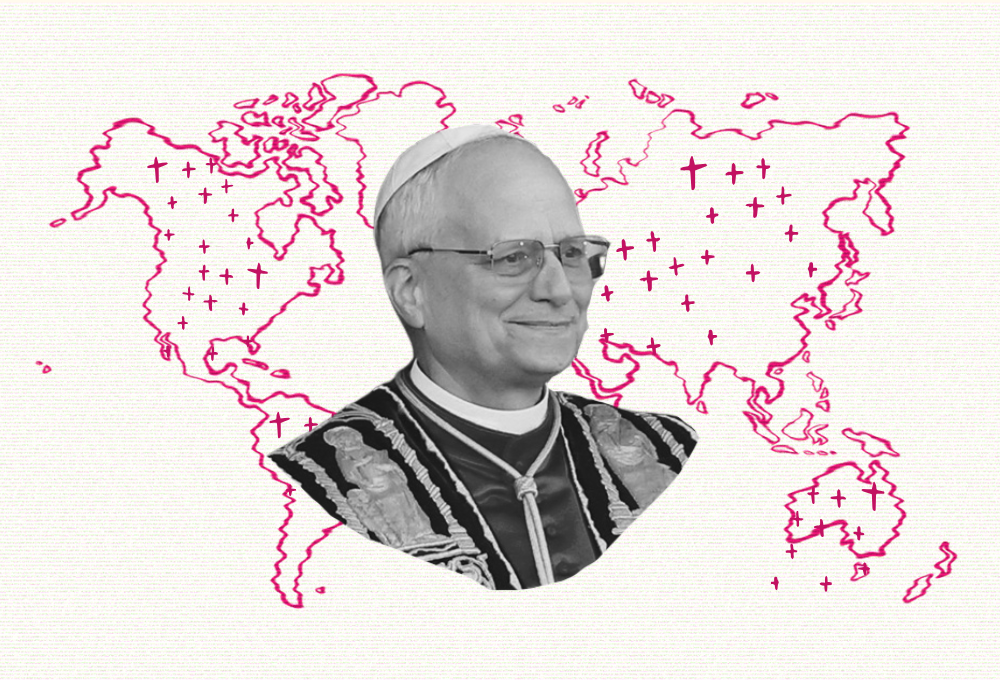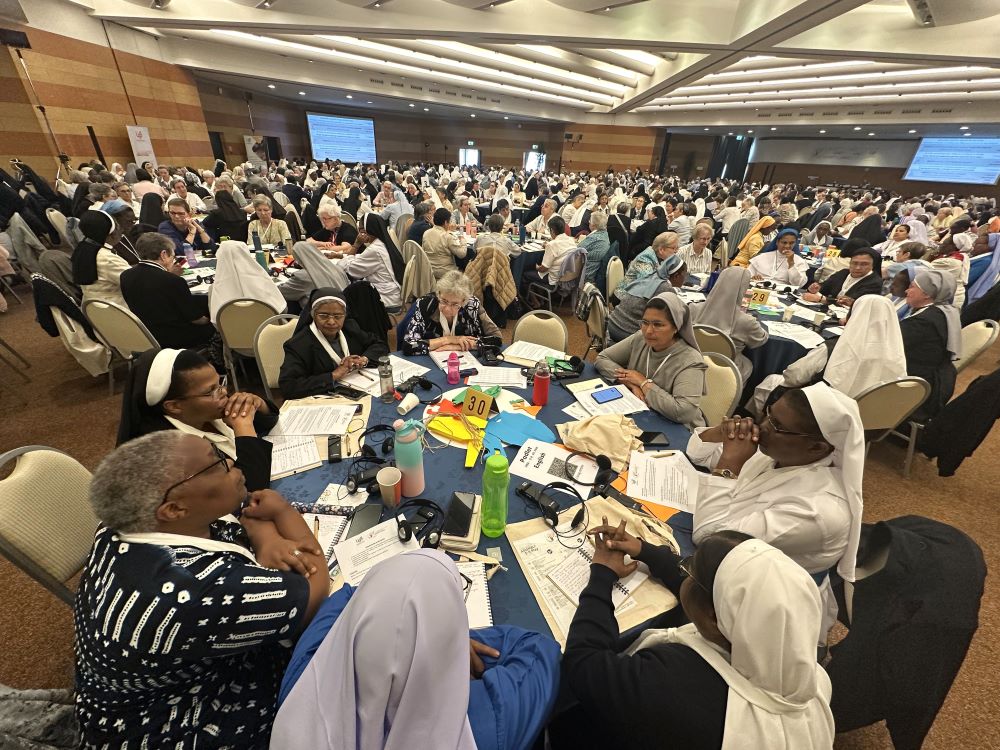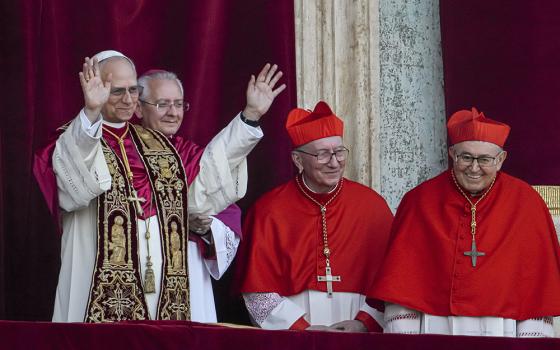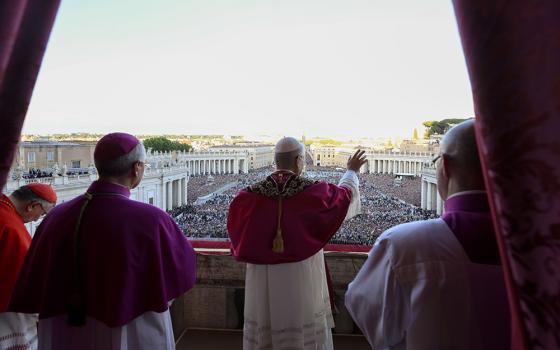
(GSR graphic/Olivia Bardo/OSV News/Reuters/Claudia Greco)
A week after Pope Leo XIV was elected, Catholic sisters around the world have hopes for change under the new pontiff — and are even suggesting possible papal priorities, including an expanded role for women in the church.
Whether the sisters work in advocacy positions at the United Nations or have other international connections; found themselves in Rome during the conclave; or are engaged in grassroots ministry, they continue to hail the surprise election of the Chicago native as a promising sign for the church.
"Our new pope's election is living proof that seeds of universal love — unity, friendship, charity and service, the backbone of the Augustinian order — are alive and well and will be nurtured through the very being and global shepherding of Pope Leo XIV," said St. Joseph Sr. Irene O'Neill, who heads the sister-run nonprofit Sisters Rising Worldwide, based in St. Paul, Minnesota.
Sisters took Leo's initial blessing — "Peace be with you all!" — as a sign of the pope's priorities.
'Yes, he's an American, but he's a pope for the world.'
—Sr. Sharlet Wagner
That Leo is a North American was less a unifying theme for many sisters who spoke with Global Sisters Report than his international experience as missionary, bishop and citizen of Peru.
In an interview in Rome, Sr. Sharlet Wagner, president of Sisters of the Holy Cross and the former president of the U.S.-based Leadership Conference of Women Religious, said she was happy about the election because "he seems like a good man."
She praised the new pontiff's mission experience, saying he "understands the missionary spirit," as well as religious life, being an Augustinian who's lived in community.
"I think it's coming at a very good time," Wagner said, adding it is likely that in the "cardinals' mind was the world situation, the U.S. [political] situation, and sending a message of how we need to be more in line with the Gospel."
"Yes, he's an American," she said, "but he's a pope for the world."
The need for a 'global person'
"We have someone with global experience, and that's vital," said Sr. Veronica Brand, a Zimbabwe native who represents her congregation as an NGO organization at the U.N. "We need a global person right now."
"He comes from a position of dialogue, not power," said Brand, a Sacred Heart of Mary sister. Leo seems to be a "bridge-builder and open to dialogue," she said.
An element of that may be his age, Brand said. At 69, Leo is the first pope who was a child before the Second Vatican Council of 1962-1965 — meaning his formation as a cleric was heavily influenced by the council, she said.
Irish Loreto Sr. Patricia Murray, the executive secretary of the Rome-based International Union of Superiors General, or UISG, noted the pope's name, lauding Pope Leo XIII's concern for the "the rights of the workers, looking at the conditions of work and also just looking at the needs of the poor. "
Leo XIII's landmark 1891 encyclical Rerum Novarum is the document on which much of Catholic social teaching has been built.
"By choosing a name like that, you're in a sense showing that Catholic social teaching is important and is an important emphasis for us as we move into the future." Murray said in Rome at the conclusion of UISG's May 5-9 plenary.
Sr. Jane Wakahiu, who attended the UISG gathering and witnessed the announcement in St. Peter's Square, said the pope's chosen name "expresses his commitment to a mission of peace, compassion, unity and human dignity."
"These values align well with the Catholic sisters' mission of compassionate care, accompaniment and service to people in the peripheries," said Wakahiu, a member of the Institute of the Little Sisters of St. Francis, Kenya, and associate vice president for program operations and head of Catholic Sisters for the Conrad N. Hilton Foundation (a major funder of Global Sisters Report.)
As Cardinal Robert Prevost, his leadership of the Dicastery for the Bishops was marked by welcoming, nurturing and encouragement of "women's contributions to the discernment of new bishops," Wakahiu said.

Sister leaders from around the world gathered in Rome May 5-9 for the International Union of Superiors General plenary, which coincided with the conclave to elect a new pope, to discuss the future of the church and the role of women religious. (GSR photo/Soli Salgado)
Papal to-do lists
Leo's intercultural legacy also excites some sisters.
Two Indian Medical Missionary Sisters, who recently attended the United Nations-sponsored Commission on the Status of Women in New York City gathering, mentioned priorities for a potential papal to-do list.
For Sr. Babita Kumari, priorities include decentralizing church power structures and fighting discrimination based on caste, class and gender exist in the Catholic Church, "in spite of making an extra effort to walk on the path of synodality by the late Pope Francis," she said.
In a similar spirit, Sr. Regy Augustine said she wished for a papal embrace of a more equal role and voice for women in the church, "especially in decision making and in holy rituals," she said, and to address the needs of migrants and of LGBT Catholics.
Sr. Ann Lasok, a member of the Ukrainian Catholic Order of St. Basil the Great, said she is happy that the pope has already spoken of the need for a "just peace" in Ukraine, as well as for returning kidnapped Ukrainian children from Russian-occupied areas. And she is heartened that Pope Leo has worked with and has been open to the Eastern churches, such as the Ukrainian Catholic Church.
Beth Blissman, the Loretto Community's U.N. representative, said her prayers include Leo immediately addressing the climate crisis and "calling to account all of the government and corporate leaders who dismiss the reality of the urgent need for climate justice."
Blissman would also like to see the Vatican back a proposed Fossil Fuel Nonproliferation Treaty "that would provide a concrete, binding plan to end the expansion of new coal, oil and gas projects and manage a global transition away from fossil fuels that is fast, fair and forever."
A hope for interfaith dialogue
In central Vietnam, sisters' hopes include the possibility that Leo might visit small Asian countries like Vietnam, Cambodia and Laos — countries with no diplomatic relations with the Vatican, said Sr. Anne Truong Thi Lanh, former superior of the Lovers of the Holy Cross of Hue.
That would console Christian communities facing restrictions on religious activities and give them strength and courage to bring Gospel values to others, she said.
"We pray that Leo XIV will live humbly, welcome the marginalized, uphold Christian values, share humanity's suffering, unite all nations in brotherhood and inspire hope and renewal in Christians' faith life," Lanh said.
Sisters cheer as the former Cardinal Robert Francis Prevost, who has chosen the papal name Leo XIV, appears on the central balcony of St. Peter's Basilica after his election at the Vatican May 8, 2025. (OSV News/Reuters/Marko Djurica)
Lanh also hopes the first North American pontiff will continue Francis' legacy by prioritizing the poor, particularly migrants and marginalized communities in Asia, a region plagued by natural disasters, conflicts, human trafficking and the exploitation of natural resources.
Of special interest in Asia — the world's most populous continent and the cradle of many major religions — is the importance of promoting interfaith dialogue to "foster harmony among followers of different religions and encourage collaboration in caring for the environment and supporting the poor both materially and spiritually," Lanh said.
Those themes resonated with sisters attending the UISG plenary in Rome. Sr. Margo Ritchie, president of Sisters of St. Joseph in Canada, told GSR she hopes Leo's selection will be a recognition of "a movement afoot, and that that movement, that arc of justice, is going to continue in the church," particularly on issues such as climate change and immigration.
Sr. Lucy Hometowu, superior general of the Sisters of Mary Mother of the Church, from Ho, in the Volta region of Ghana, said she is "very excited that he's an American," calling that a sign that the church is expanding and is becoming more inclusive.
Advertisement
"I could see traces of Pope Francis in him," Hometowu said. "I think he's going to be a unifier. He's going to bring everybody together because in his first speech he spoke about peace and unity, and that was very inspiring to me."
She said the excitement she witnessed on the broadcast from St. Peter's Square "gave me that hope, that the Catholics who left the church are going to come back. There is a renewed hope and vigor and energy, I can see it. We will pray for him to be successful."
Sr. Maria Clara Mota Cancino, superior general of Missionary Sisters of the Sacred Heart of Jesus in Chihuahua, Mexico, said that Leo's experience in Latin America "tells me that he'll be very close to the needs of the most vulnerable. That gives us a lot of confidence, great promise to all who were [supportive of] the initiatives of Pope Francis."
"I think that we're in the hands of a good pope," she said, "and that God gave us the pope that the church and the world needed at this time."






